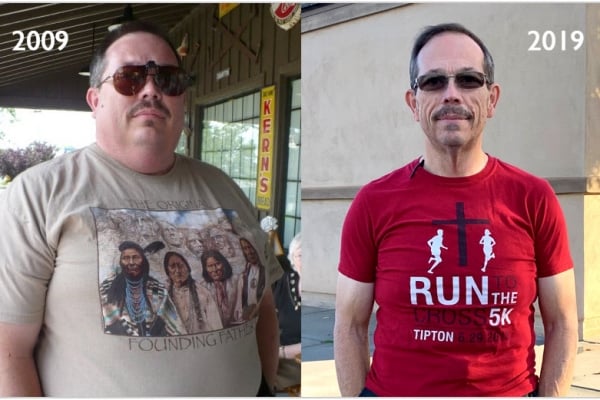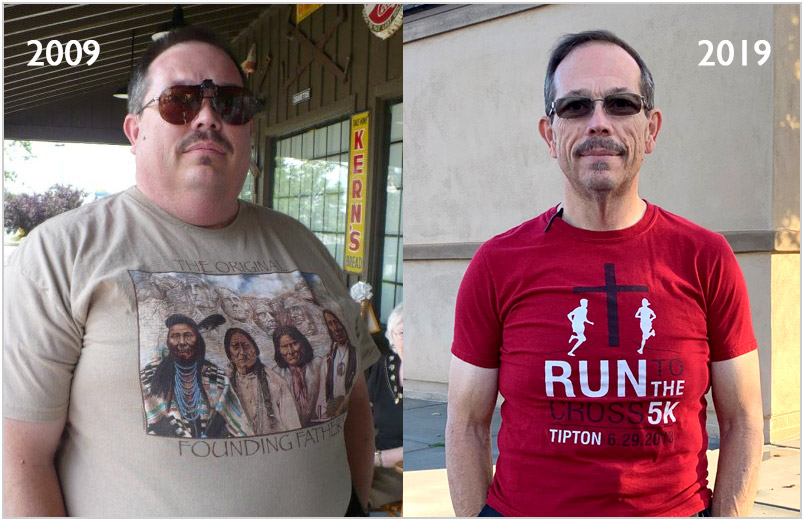
12 Steps
FALL/WINTER 2019 | 5 MINUTE READ | STEVE CARTWRIGHT WITH CONNOR OWEN
I’ve found it important to remind myself of where I come from and who I once was. As I walk into my office each day, I see the size 68 pants and 4XL t-shirt on my wall—clothes that I used to wear over my brokenness. I don’t wear those pants or that shirt anymore—they don’t fit, since I’ve shed 180 pounds over the last eight years. And that brokenness that I started dealing with ten to twelve years ago wasn’t something that happened overnight; it was the result of what took place in my childhood.

Dyslexia wasn’t something many people understood when I was growing up. My mom, who was always encouraging, told me later in my life that she didn’t know what to do with my dyslexia. My teachers didn’t know what to do either, and their response wasn’t encouragement. It was taunting. I still remember one teacher dancing around me in front of the class, calling me “a retarded idiot.”
When we feel brokenness or hurt, we look for comfort or relief. It’s a natural response. But the danger in that seeking process is the potential to find something that doesn’t mend or heal—something that only increases or creates a new brokenness.
I turned to food. It never judged me; it never called me names; it accepted me; and it was always there. But it never offered any relief from the pain. It only put me in a different state of brokenness—this time resulting in a hospital visit, becoming a diabetic with decreasing eyesight. I was trying to do my best for God, but I wasn’t at my best for God.
The doctor told me if I didn’t make changes in my eating habits, I was going to be hospitalized again in a matter of years, bluntly saying, “God has an appointed time for everyone to die. Steve, you are cutting that time short. Your quality of life is going to get worse from here.” The stark reality of my need for a new way of living was clear. I knew a change needed to be made.
This time—broken and needing a new solution—I turned to God. And this is where my story shifts from brokenness to healing; dark to light; despair to hope.

My wife, Debbie, and I live on the American Indian Field (AIF) in Arizona and started a recovery group called SOAR, which stands for Servant-Overcomer Addiction Recovery. The name comes from Isaiah 40:28-31. The prophet Isaiah wisely wrote that we are weak and powerless, and God, in His infinite power, never grows weary, understands all, and makes it so that His people will soar on wings like eagles. That lens, through which we see ourselves as powerless and God as all-powerful, shapes SOAR. It’s the acceptance that we are broken and we serve a God who can pick us up and use our brokenness for His kingdom.
I could never figure out why God would call someone who is broken into ministry. What could God do with a damaged person like me? I learned that He can use me to start a ministry that helps bring people healing and recovery from their own brokenness and addictions, because I’ve been there before.
I’m reminded of a story:
This guy’s walking down a street when he falls in a hole. The walls are so steep, he can’t get out. A doctor passes by, and the guy shouts up, “Hey you, can you help me out?” The doctor writes a prescription, throws it down in the hole, and moves on. Then a priest comes along, and the guy shouts up, “Father, I’m down in this hole, can you help me out?” The priest writes out a prayer, throws it down in the hole, and moves on. Then a friend walks by. “Hey Joe, it’s me. Can you help me out?” And the friend jumps in the hole. Our guy says, “Are you stupid? Now we’re both down here.” The friend says, “Yeah, but I’ve been down here before, and I know the way out.”
That’s SOAR. We work with people struggling with all sorts of addictions and brokenness: eating disorders, anger issues, the inability to forgive, self-harm, drugs and alcohol abuse—because we’ve been there. It’s like the blind leading the blind, but different. We’re the healed leading the broken.

We use the 12 steps that are found in The Life Recovery Bible, which closely mirror those of Alcoholics Anonymous (AA). While the difference in wording between the two programs is slight, The Life Recovery Bible emphasizes God’s role in the healing process and the importance of seeking Him first.
The community and relationships forged in SOAR provide a way for broken people to realize they’re not alone. We are all broken to some degree, no matter our addiction. But we can’t settle for defeat and assume that God can’t use us. The preface of The Life Recovery Bible tells us that the way to recovery and into God’s perfect will is begun by “becoming aware of our problems and our need for help, developing the desire to change, and gaining the willingness to do whatever it takes.”
Whether it be weight loss, drug abuse, watching excessive amounts of TV, or something else—we all have our addictions, and the goal of recovery is to become the healthier person God envisions for us. In fact, if we’re honestly seeking God, then we can rely on Him to do the work in us—giving grace and restoring us mind, body, and soul. That’s what He did for me, and that’s why I say the same prayer every morning, surrendering to God and asking Him to continue molding my life: “Lord, if I want to be my best for you, what else do I need to work on?”
Steve and Debbie Cartwright live in Arizona and are involved in multiple ministries in addition to SOAR. To follow the Cartwrights’ journey, visit www.facebook.com/CartwrightMinistry.
ACTION STEPS
PRAY: Take a personal inventory and ask God what you need to do to be your best for Him—ask Him to expose brokenness that is within you. Then, ask God to repurpose your brokenness so that you might help someone else who is struggling.
GIVE: Our guiding books at SOAR are The Life Recovery Bible and The Life Recovery Devotional. Not everyone who attends has a copy of each, as the combined cost for both books is $25. You can sponsor an attendee for $25 and give someone the chance to receive the materials needed to begin the journey of recovery. Go to www.wgm.org/soar to donate.
GO: Have you ever struggled with addictions and found healing, or do you have a passion to help those struggling with addictive behaviors? You could visit the AIF and help bring the Good News and healing of Christ to someone who is on the road to recovery. Visit www.wgm.org/serve to let us help intersect your passion with God’s heart.
